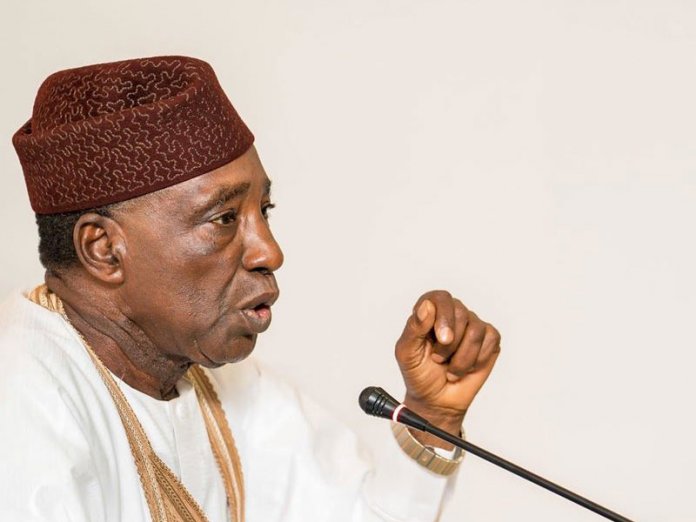The Minister of Agriculture and Rural Development, Alhaji Sabo Nanono has regretted that Nigeria spends about $1.5 billion importing dairy products annually.
The Minister said despite the potentials in the dairy industry, 60 per cent of dairy products consumed in the country is imported while the remaining 40 per cent is produced locally.
Speaking at the National Diary Policy Stakeholders Engagement in Abuja, Alhaji Nanono said there is a need to harness the potentials in the dairy sector in order to address some socio-economic and national herd management issues.
He said presently, the Nigerian dairy industry is largely subsistence and consists of local milk production, importation, processing, marketing and consumption.
“The consumption of aggregated and bulked milk is less than 20% of the local potential. Nigeria’s milk production accounts for only 13% of West African production and 0.01% of global dairy output.
“The gap between supply and demand for dairy products is widening as a result of an increase in population and urbanization.
“The per capita consumption of milk is 8 litres per year, representing very low consumption levels when compared with the global averages of 44 litres of milk (FAOSTAT, 2019). Consequently, the long neglect of the livestock sector has put a lot of burden on the import bills of the country.
“About 5 billion USD worth of food is imported yearly into the country out of which milk and dairy products account for 1.2-1.5 billion USD (CBN 2019). Hence, the annual dairy consumption is met by 60% imports and 40% local production.
He said there is, therefore, a need to foster sub-sectoral growth, one that is inclusive of smallholders and all key players along the value chain.
“This requires the buy-in of national and multinational stakeholders. To facilitate this growth, the Ministry is presently collaborating with the Federal Ministry of Industry Trade and Investment (FMITI), Raw Material Research Development Council (RMRDC), Central Bank of Nigeria (CBN), Federal Ministry of Finance, Budget and National Planning and the private sector, to promote and develop the local dairy industry.
“This will facilitate the process of evolving a National Dairy Policy that will articulate a clear road map and strategies for the attainment of our development aspirations in the dairy industry,” he added.
The Minister said the Federal Government is committed to providing the necessary enabling environment for sustainable direct investment in the dairy industry and other key sectors of the economy.
“Consequently, the federal government welcomes at all times, the support, collaboration and partnerships of all concerned stakeholders towards ensuring the success of her National Food Security and economic diversification initiatives,” he added.
On his part, the Permanent Secretary, Ministry of Agriculture and Rural Development, Dr Ernest Umakhihe said presently, Nigeria is far from meeting national sufficiency in dairy production in particular, and therefore spends a huge amount on the importation of dairy products to bridge the huge gap between supply and demand.
“Successive Administrations had made efforts to close the gap through programmes such as Dairy Development Programme, National Livestock Breed Improvement Programme among others, thus creating opportunity for private sector participation.
“The proposed policy, therefore, is to give defined direction for the country’s dairy industry where all players at whatever scale will be expected to abide by rules of operation, in terms of production, processing and marketing of dairy products in Nigeria,” he noted.
YOU SHOULD NOT MISS THESE HEADLINES FROM NIGERIAN TRIBUNE
Nigeria Recorded 1,114 COVID-19 Infections Last Week, Lowest In Four Months
In the past two weeks, Nigeria recorded 3,414 new COVID-19 infections, which is the lowest the country has recorded since the beginning of the second wave of the pandemic in December.
In the penultimate week, (March 7 – 13), there were 2,300 cases, a reduction when compared to the 2,817 recorded in the previous week’s (February 28 – March 6)…Agro-industrialisation: Cross River fabricates easy to operate utility machine for farmers
Inside Ibadan Bound Train From Lagos
The train started the 156.65 kilometres journey to Lagos at exactly 08:00hrs. The pace of its acceleration was minimal.
At about 25 minutes, the train slowed down at the uncompleted Omi-Adio terminal, a village on the Abeokuta/Ibadan expressway; it’s a stone throw from Apata in Ibadan. Conveyance of passengers from there and other terminals has not kickstarted as the terminals are still under construction and workers were found there…Agro-industrialisation: Cross River fabricates easy to operate utility machine for farmers. Nigeria still imports 60% dairy consumed ; Nigeria still imports 60% dairy consumed ; Nigeria still imports 60% dairy consumed ; Nigeria still imports 60% dairy consumed






